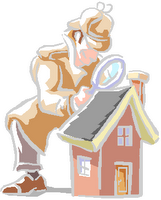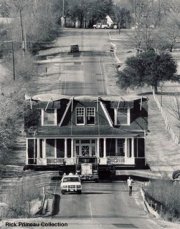
Why You Need a Home Inspection
When the home buyers are caught up in the speed, drama and pressure of bidding on a house that they may willing to skip a few steps to make sure they acquire their dream house. They're suddenly willing to pay a few thousand more than they had intended. They're willing to go for a quicker closing date. They're even willing to skip the home inspection process.
Don't fall in love with a house until the house had been examined by a professional. The house could have any number of problems in structural, roofing, exterior, foundation, heating, plumbing, electrical, insulation etc.
Home inspections have been around for quite a while, and for good reasons. This process, which can cost between $300 and $500, is often a condition on buying the house. It usually takes a few hours and is easy to arrange. Hiring a professional home inspector is a small investment of your time and money. But, it's well worth the expense because you won't have to deal with costly and unexpected surprises once you've bought your home. Also you can gain a wealth of information about the condition of a property before they buy it. A home inspection is not intended to provide warranties or guarantees, and is not to be mistaken as a warranty on the house.
The final sale of a home can hinge on the results of a home inspection – even for a million dollar home. While a home inspection is a critical component of buying and selling a home, knowing your home inspector is just as important. What home buyers need most is a source of trustworthy, competent, qualified home inspection professionals.
Recent surges in the popularity of home inspections have created an over-populated inspection industry where not all inspectors have the training or experience to do a good job. Anyone can say that they are a home inspector. Be wary of low-priced home inspectors whose only credential is a certificate acquired online, or by correspondence, or from attending a three day course. There are some people in the home inspection industry who are not fully qualified - if at all - and they should not be recognized as home inspectors.
Home inspection is a discipline that requires special training, knowledge and communication skills. That is why it is important to choose an inspector wisely. Home inspectors should have a general understanding of all the various systems and components in a home. Many have practical experience or a background in engineering, construction and related building trades. The more experienced a home inspector is, the more they have seen, the more likely it is they will be able to detect any less obvious problems.
Reputable home and property inspectors generally belong to CAHPI-Canadian Association of Home & Property Inspectors, which has set standards, which, is recognized by the Real Estate Associations and federal and provincial governments. CAHPI is the only national non-profit professional organization in Canada that rigorously tests home inspectors about their technical knowledge and diagnostic expertise prior to joining the organization as well as requiring continuing education after admission to keep current with new technology and building practices. Membership in CAHPI's Provincial Associations and the Registered Home Inspector designation are earned credentials which attest to an inspector's competence and professionalism. To earn the right to be Registered Home Inspectors (RHI), inspectors must demonstrate to the CAHPI's provincial association that they have a broad knowledge of construction and building practices in their province and that they have acquired three components for qualification: basic skills specific to the practice of home inspection; technical background acquired through education and experience related to building science; and practical home inspection experience through the performance of at least 200 home inspections to CAHPI Standards. A member cannot advertise or promote his or her membership until they have reached the minimum standards of a practicing member. To become a member, an inspector must meet professional and educational requirements followed by a review. Seasoned, professional registered home inspectors are full-time home inspectors. Registered home inspectors are bound by a strict code of ethics and must adhere to specific standards of practice. Registered Home Inspectors perform the best inspections by far.
You should ask to see proof of the inspector's membership in CAHPI's provincial association. Determine if the inspector intends to meet the CAHPI national standards of competency. To guard homebuyers against incompetent, negligent and bogus home inspections, the association in your province will be pleased to clarify their membership categories and any particular inspector's membership level. Check out www.cahpi.ca. The site will refer you to a complete list of Registered Home Inspectors in your area.
Visit www.ashi.org to find more detailed information about home inspection. Be present when the professional home inspectors assess your potential home. Ask questions and take notes of what repairs need to be done. They will give you their initial reactions as they are touring your home, and will follow up with a comprehensive package of information on the condition of your home. It is an invaluable piece of the home buying puzzle.
Newer Homes also need Inspection
New construction isn't always problem-free. Since the 1980s, when Canada Mortgage and Housing Corporation (CMHC) ended its consumer protection role through construction inspections, housing quality has suffered. For instance, CMHC estimates that more than 65,000 homes in B.C. suffered serious water infiltration problems in B.C.'s leaky condo crisis of the 1990s – a crisis that continues to this day. While B.C.'s crisis is perhaps the best known disaster in Canadian history, defective homes are a serious problem across Canada. In 2005, the Canadian Home Builders' Association (CHBA) estimated that 10 per cent of Canada's builders are problematic. Other estimates find 20 per cent to 25 per cent of home builders as problematic. Although there are good builders in Canada, consumers and Realtors have no reliable means of knowing who they are. Consumers who find themselves with a defective home and an unresponsive builder naturally turn to their home warranty program for assistance. This too can be problematic. In Ontario, for example, new home purchasers face a mandatory payment to TARION for warranty coverage. Purchasers should recognize TARION as an insurance company that will require that you prove your claim.
TARION does not serve as an advocate for purchaser. The TARION claim process is complicated, and, therefore, must be pursued with great care in order to avoid pitfalls. Municipal government officials involved in the home construction process usually acknowledge home construction industry and warranty program problems, but often simply advise the homeowner that they can settle their issues through civil litigation. Given the time and high costs involved in the legal system with no guarantees of success, the courts are not a viable option for most Canadians.
Given a system that is not conducive to construction dispute resolution, many homeowners conclude that they have no option but to quietly sell their flawed homes without disclosing the known problems to potential purchasers, despite the fact that sellers are required by law to disclose known defects. Home buyers protect their investment by retaining a competent registered home inspector to inspect the home, regardless of whether it is newly built or a resale home. While some problems may remain hidden behind drywall, a registered home inspector can often detect problems unrecognizable to the average consumer.
Deal with the Bad News
It can be heart breaking to find out all the problems after a home inspection, but be realistic. Remember that no home is perfect. What you need to decide is whether or not you are willing to fix the problems. Ask yourself these questions:
Can you afford the recommended renovations or repairs?
Does the house meet your needs in its current condition?
Knowing these problems, is the house still a good investment?
Once you've had a home inspection, you'll have peace of mind that you've made an educated decision on buying a home. It's worth it!
Article courtesy of: By Nalliah Thayabharan, Registered Home Inspector, Member of CAHPI-Ontario and ASHI, Expert Building Inspections Ltd., Markham ON 905 940 0811 www.expertinspector.com
For more information please contact A. Mark Argentino
A. Mark Argentino, Broker, P.Eng.,
Specializing in Residential & Investment Real Estate
RE/MAX Realty Specialists Inc., Brokerage
2691 Credit Valley Road, Suite 101, Mississauga, Ontario L5M 7A1
BUS. 905-828-3434
FAX. 905-828-2829
E-MAIL: mark@mississauga4sale.com
Website: Mississauga4Sale.com










No comments:
Post a Comment